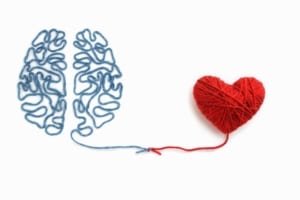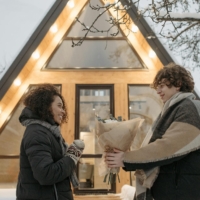How do we cultivate a feeling of being ‘in love’ with our partner long term?
Helen Fisher, PhD., anthropologist and love expert, and her team, have put over 75 people through a brain scanner to learn more about the brain in love. They found patterns within the brains of those that were in love and in long-term relationships; specifically, one pattern shows us brain activity in the frontal cortex that enables one to overlook the negative and accentuate the positive. They also found brain activity in the places linked with empathy and associated with the ability to control emotions.
Essentially, what was discovered is that the brain ‘in love’ has the ability to accentuate the positive while overlooking the negative. Feeling appreciation for our partner can light up our brains in the same places that help us be in love. Many of us have a weak appreciation muscle, so just like working out, this may take some time to get really good at it. However, doing it poorly is so much better for us than not doing it at all!
You can make it a game to find things to appreciate about your partner:
Look at who they are, the things they do, their values, etc. This may be easiest to do with things that are similar to you.
- Do you value a tidy home, and they make efforts to put things away?
- Are they kind to strangers, and you deeply value kindness?
Go for these easier appreciations, as a warm-up, to get yourself going with gratitude.
For example, you could express, “I appreciate your commitment to be a good parent. I imagine sometimes it’s hard to be so patient with the kids. When I hear you respond to their agitation with a soft voice, I feel more capable myself, and a part of me relaxes inside.
Notice and express your satisfaction with their behaviors toward you:
- Did your partner cook you a meal?
- Did they greet you with a kiss?
- Did they reach for your hand or tell you that you are beautiful?
- Do they make special time for you? Bring you special gifts?
You could say, “When you bought us tickets to that show, I knew you were listening to me and that my desires matter to you.”
Next, look for who they are in the world:
- Are they a loyal friend?
- Do they have a creative mind? An adventurous spirit?
- Are they reliable and steady?
You could express your gratitude for these qualities by saying, “You are always there when a friend needs you. I see your loyalty and feel secure, all the way to my bones. I’m proud to be your partner, and your friends are lucky to have you.”
Don’t forget to notice things they do for themselves or others!
Sometimes we can forget that our partner has a relationship with their self and relationships with many other individuals. While thinking about your partner, consider the way they make you feel:
- Do they make you feel inspired? Or motivated?
- Do they enjoy staying healthy?
- Do they practice meditation? Or enjoy creating a beautiful garden?
A way to show your admiration is by saying, “I saw that you signed up for a class at the community college. Your desire to learn inspires me to keep growing and trying new things.”
The more advanced appreciation tactics come in handy when your partner is different from you or may even do things that you find annoying.
To remain appreciative, consider any possible benefits of having a partner that’s different from you. A couple of example appreciation statements are:
“Even though I sometimes complain about your messy hair, when we are meeting new people, because I’m worried they will judge you unfairly, I think it’s super sexy at home. You are so gorgeous to me.”
“I get annoyed when I’m tired and want to leave the party, and you take another 30 minutes to say goodbye to everyone. However, I admire your commitment to your friendships, and I benefit from that in our close community.”
Giving appreciations step by step:
- What I observed
- How I interpreted it or what it means to me (sometimes this can be omitted)
- How I feel (get more elaborate than good/bad)
Delivery (tone of voice and eye contact) is important. In-person gratitude (not text) is best until you both become strong appreciators. Also, make sure your partner is available to hear your appreciation. Don’t give it as they rush out the door or are watching television. Instead, share it in a pause. Many couples like to do this before going to sleep at night.
Remember, it’s not just “thanks for washing the dishes, Sweetie.” It starts there, but elaborates to the impact they have on you. “Thanks for washing the dishes Sweetie. I see you supporting our household like we are a team. When I think we are a team, I feel strong like we can conquer the world.”
You will find that giving good appreciation also builds self-awareness. You must ask yourself – what meaning are you giving their behavior? Much of this is below conscious awareness, so it will take some thought. “How do I feel?” This can build your feeling vocabulary. Even though you may practice appreciation for your relationship, the impact it can have on one’s self is just as valuable.
After you get warmed up, and flexing your appreciation muscles feels natural, you might throw this one into the mix: “I imagine you do lots of little things that I never see, making our lives better. What are they?” Then, make an effort to actively appreciate those things.
When working with couples in therapy sessions, I suggest each appreciates the other at least once a day, every day, for two weeks and see how they are feeling.
Seeking a couples therapist, individual therapist, or attending a weekend couples workshop can help you learn better communication tactics and deepen your “in love” feeling with both yourself and with your partner. Always remember, while learning anything new, be patient with yourself and your partner; all good things come in time!
Have fun flexing your appreciation muscles!
 Shanna LoPresti, AMFT Counselor
Shanna LoPresti, AMFT Counselor
Shanna is an Associate Marriage and Family Therapist, in the East Bay, who holds a masters in Somatic Psychotherapy from the California Institute of Integral Studies. She believes that we receive little to no training in relationship skills, yet we shy away from seeking assistance when things get hard. Shanna designs her sessions to help you better understand yourselves and your partner, including diagnosing and treating cycles that takes over. She enjoys identifying intimacy-blocking behaviors, and helping to building skills to communicate effectively and diffuse conflict within relationships. Her goal is to empower you to reconnect and reinvent yourselves and your relationship, again and again.

 Call Us Now
Call Us Now Shanna LoPresti, AMFT Counselor
Shanna LoPresti, AMFT Counselor




